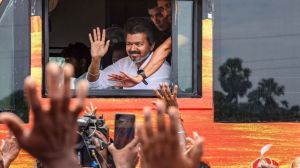Another rollback, Mr Sinha
Prime Minister Vajpayee deserves to be congratulated for his bold step in addressing a public rally in Srinagar, a step no prime minister ha...

Prime Minister Vajpayee deserves to be congratulated for his bold step in addressing a public rally in Srinagar, a step no prime minister has ventured to take for the past 16 years because of ongoing terrorist violence. And even more so for firmly rolling back his foreign minister Yashwant Sinha’s articulated dreams of pre-emptive military action in response to Pakistan’s cross-border terrorism and opening the window of diplomatic opportunity.
Given Pakistan’s internal power structure and policy goals, if there is one thing that its elites would want better than pre-emptive use of force by India is the loose talk of pre-emption by Indian leaders. The prime minister’s unambiguous statement proffering a hand of peace and a promise of dialogue to Pakistan is just the opposite of what pre-emption hawks would have the country blunder into. The fact that this took the Pakistani leadership by surprise is proof enough of the sagacity of the approach.
Vajpayee’s willingness to make a third attempt to start a process of dialogue with Pakistan has no doubt drawn strength from the demonstrated preference of the people of J&K for the democratic principle and their rejection of violence. However tenuous there is a democratic dispensation in Islamabad as well.The emphasis on talks to solve “all issues” peacefully even if it takes time deserves serious notice by everyone. More important, the visit, the rally, and what the prime minister said at the rally, clearly endorsed the PDP’s “healing touch” policy. It is all the more regrettable that the Congress leadership stayed away from the venue in an attempt to score petty political points.
There are no magic solutions to the problems between Pakistan and India. Yet we are once again at a defining moment in dealing with Pakistan, like we were at the time of elections last year, in terms of the domestic situation prevailing at that time. For India, ending terrorism driven by extremist religious ideology remains a crucial objective. But the lowering of tensions and injecting stability into the bilateral relationship would be important goals before we can expect any movement toward resolution of outstanding issues. There is awareness in Washington and London that Pakistan is not living up to its promises to stop terrorism and infiltration.
While Pakistan’s importance to the US may increase in future, its policy of promoting jihadi terrorism is likely to come under increasing pressure, even if applied quietly. New Delhi’s willingness to explore paths to peace through dialogue would help intensify that pressure.






- 0118 hours ago
- 0218 hours ago
- 0318 hours ago
- 0418 hours ago
- 0518 hours ago

























